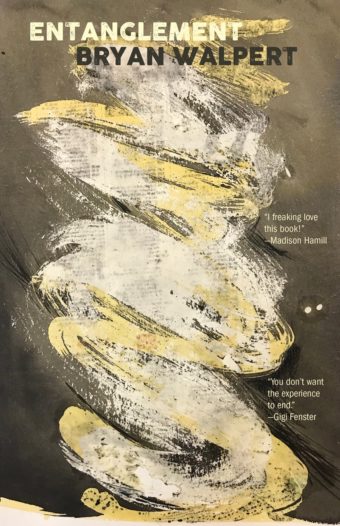Bryan Walpert’s latest novel, Entanglement, has already garnered notable attention since its launch in late 2021. It has recently been longlisted for the Ockham Book Awards 2022, and was named as one of the NZ Listener’s best 100 books of 2021. Walpert is the author of the novella Late Sonata (which won the 2020 Seizure Viva La Novella Prize), a short story collection, four books of poetry and two of literary criticism. With Entanglement, he’s built on these previous accomplishments to create a beautiful, stylistically adventurous and deeply philosophical work.
Three intertwined narratives form the structure. A memory-impaired time traveller attempts to correct a tragic mistake he made in 1976, when, as a frightened child, he abandoned his brother Daniel on a frozen lake in Baltimore. A writer-in-residence at the Centre for Time in Sydney in 2011 becomes romantically involved with a philosopher from New Zealand. An author at a lake retreat in New Zealand, 2019, uses workshop prompts to explore the disintegration of his marriage and the tragedies which have marked his life.
The sections set in the Centre for Time present us with aspiring novelist Paul, along with all his preoccupations for the time travel novel he’s writing: discussions chomp through everything from quantum tunnelling to Minkowski diagrams to chronology protection conjecture. This access into his research gives the lay reader a chance to grasp the basics of quantum theory, and the viability of going back and forth in time. This may sound like info dump territory, but it is all skilfully woven into the plot, especially within the passages exploring the connection between Paul and New Zealand philosopher love interest, Anise. Together they deploy nerd-bonding language to navigate their way through the human heart:
More pillow talk, she murmured.
Okay, I said. We are but tachyons…
How did you get past first base in high school?
I was just going to say that perhaps we were made to go faster than light.
How did you even make it through high school?
Their initial spark and the subsequent trajectory of all the highs and lows is believable, nuanced and intricately captured. One passage delivers foreplay in the form of a discussion between relativity versus presentism. I kid you not: it’s a very sexy scene. It also foreshadows the future in a few sentences towards the end of the chapter, adding depth to their (poignant in retrospect) pillow talk about time travel.
She said, pour me another Shiraz. I said, we’ve already made it through the bottle. She said, there’s another in the pantry. Later, when we’d killed the second bottle and were lying in her bed, I said, I told you I could predict the future but she was on her side, reaching into the drawer of the bedside table and said, I don’t suppose you brought one with you.
Walpert has a screenwriter’s eye for foreshadowing and payoff, with the three narrative strands braiding together to form a Möbius strip, seams eventually dissolving. Every word of the novel’s lean 268 pages works hard for its rent, and even its title is evidence of this micro-level thoughtfulness, encompassing as it does the tragic connection between twin brothers, the superposition of subatomic particles, and the intertwining of colliding hearts. Playfulness appears in unexpected places. A discussion on Schrödinger is followed with:
A thin line of light between the door and the frame. In one world, she will be sitting at a table, facing a mirror, putting on earrings. In another, she is buttoning a sweater. In a third, she will be undressed, in the bed, her hair loose over her shoulders. My hand was on the knob. It seemed like anything was possible.
The impact of the narrator’s decision to abandon his brother in Baltimore in 1976 haunts the rest of his life (and the entire book), and also illustrates the necessity of being able to forgive yourself: the ways you can punish yourself otherwise is worse than anything a court of law may sentence you for. When our narrator is given writing prompts at the Lyndon Writers Retreat, the precise and meditative sentences draw slowly towards that fateful day. The memory-impaired time traveller may not even remember his full name, but understands he has a job to do, that if carried out correctly, may atone for all of his regrets.
At its essence, Entanglement is an exploration of how grief alters the shape of your heart. There’s a simple, devastating scene which involves painting a room. Italian physicist Carlo Rovelli is evoked in one passage as Anise explains that holding onto the view that there is no difference between matter and energy gave her comfort after the death of her father. It’s all movement, she says, and each one of us is an event. She concludes with, ‘I was lucky enough to experience the unfolding of part of the event that was my father.’ This deep dive allows the reader to forge their own path as to how they interpret the ambiguous yet perfectly rendered ending.
This review was originally published on the Academy of NZ Literature site.



